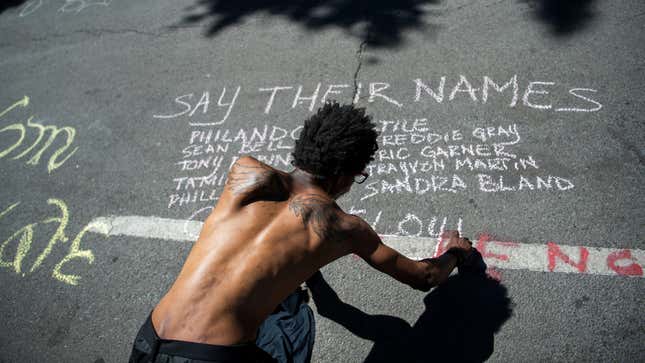
On Tuesday, a federal appeals court unanimously sided with anti-abortion protesters who were arrested in Washington, D.C. after they wrote anti-abortion chalk messages in summer 2020 during the height of the protests following the murder of George Floyd. The anti-abortion protests argued that their First Amendments rights were violated when they were arrested, and the court agreed that their lawsuit can continue.
“The government may not play favorites in a public forum—permitting some messages and prohibiting others. We conclude the [plaintiffs have] plausibly alleged the District’s selective enforcement of the defacement ordinance constituted viewpoint discrimination in a public forum in violation of the First Amendment,” the three-judge panel at the U.S. Court of Appeals for the District of Columbia Circuit wrote. It reversed a lower court opinion, saying the protesters’ rights were likely violated as none of the people creating art against the killing of Black people were arrested.
“Over several weeks, the protesters covered streets, sidewalks, and storefronts with paint and chalk. The markings were ubiquitous and in open violation of the District’s defacement ordinance, yet none of the protesters were arrested,” Judge Neomi Rao, who was appointed by Donald Trump, wrote. “During the same summer, District police officers arrested two pro-life advocates in a smaller protest for chalking ‘Black Pre-Born Lives Matter’ on a public sidewalk.”
The chalk art protest was organized by anti-abortion groups Frederick Douglass Foundation and Students for Life of America. In August 2020, the groups held an anti-abortion rally in D.C. that they had received a permit for. They claimed that a police officer gave “verbal permission to paint its ‘Black Pre-Born Lives Matter’ message on the street” as the officer “believed [Washington, D.C.] Mayor Bowser had effectively opened up the District’s streets for political markings.”
However, the lone police officer’s words weren’t enough. As the court explained:
On Aug. 1, six police cars and many police officers were waiting. The officers said the advocates could assemble in accordance with the Foundation’s permit, but if they painted or chalked their message on the sidewalk, they would be arrested for violating the defacement ordinance. Two students began to chalk “Black Pre-Born Lives Matter” on the sidewalk anyway. Despite the message being written in small, faint letters with washable chalk, the two students were arrested. The entire event was caught on video.
The group says they were denied the right to paint chalk art on public sidewalks or streets again in March 2021.
Representatives for the District argued that attempting to arrest protesters during the Black Lives Matter protests would have drained “police resources and distract officers from other priorities, such as ensuring public safety and addressing widespread looting and property damage.”
However, the appellate court said that what actually matters is that some individuals were arrested and some were not, even if both violated the defacement ordinance that summer. “Selective enforcement claims must clear a high hurdle,” Rao wrote.
Erin Hawley, vice president of the Alliance Defending Freedom, the conservative organization that brought the case, said she’s happy with the outcome, adding, “Every American deserves for their voice to be heard as they engage in important cultural and political issues of the day.”
Look, I guess if the Supreme Court has deemed that money is speech, then sidewalk chalk art must be too.